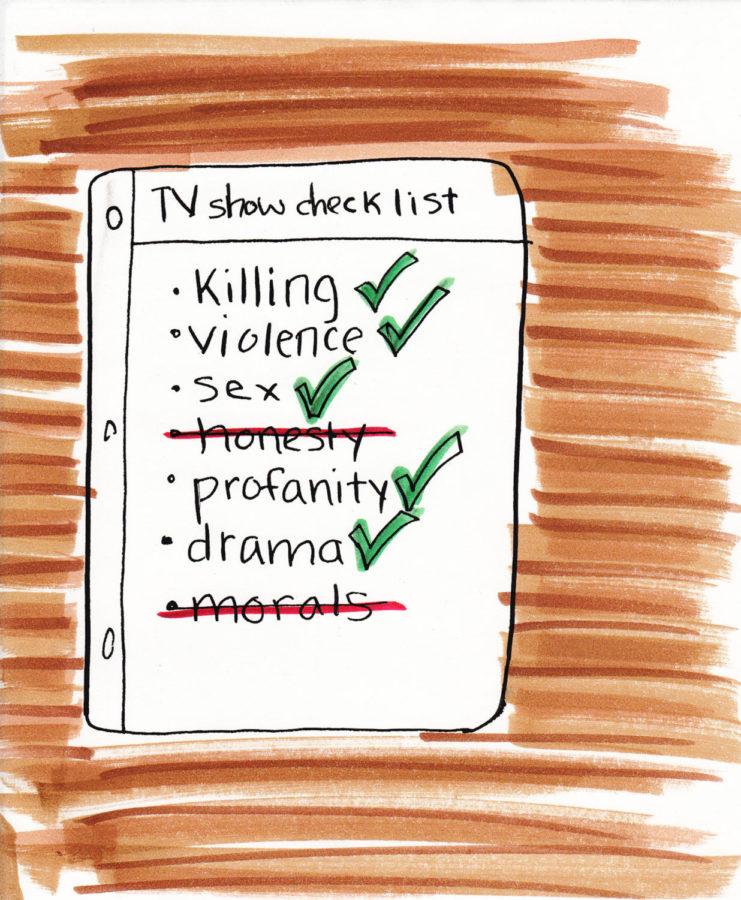Gross: Why we love bad guys
Leah Stasieluk/Iowa State Daily
What is it about drama and violence in television shows that draws in more viewers?
September 16, 2013
Drug lords, serial killers, adulterous husbands and downright jerks: These are the “heroes” of our modern television.
In the last few years, several TV protagonists have appeared who are quite a bit less than perfect. Though any well-written character has a flaw or two, some of these characters are simply not good people. These days, it’s hard to name a show in which the main character isn’t at least partially a bad guy, but it wasn’t too long ago when that wasn’t the case.
Instead of cruel monarchs or KGB spies, the heroes of 1990s TV dramas were servants of the people. The ‘90s birthed shows such as “Law and Order,” “NYPD Blue,” and “Buffy the Vampire Slayer.” The various protagonists of these shows saved or avenged innocents from evil — whether human or supernatural. They may have struggled with flaws in their personal or professional lives but they were rarely labeled as inherently bad.
A similar comparison can be made for the comedies of then and now. The comedic heroes of the ‘90s were absent-minded teenagers or families experiencing the hilarious side of benign suburb life. In current television, comedy comes from physical assault, insult and various other forms of douchebaggery.
In modern comedy shows such as “It’s Always Sunny in Philadelphia,” we laugh at the idiotic and offensive antics of people you really wouldn’t want to hang out with.
It could be argued that the change occurred at the end of the ‘90s with the show “The Sopranos,” in which a New Jersey mob leader stars. The show was a massive hit, and the “bad guy” character Tony Soprano broke down past barriers of heroic protagonists. From here, the trend continued through the 2000s to today.
What’s interesting is these current characters, with their various evils and flaws, seem to be massively appealing to the American audience.
It’s hard to get through a Twitter feed these days without encountering excited tweets about “Breaking Bad,” “Mad Man,” “Game of Thrones” or whatever other drama is currently on television. Merchandising profits for these and other shows are through the roof. “Game of Thrones” broke the record in 2012 for largest first-week DVD sales in HBO history.
Obviously, Americans love a bad boy. But the question remains: Why? Are we bad people for wanting to watch bad people?
Probably not, for a few reasons. Just as horror movies are only enjoyable because the audience’s lives aren’t that horrible, these bad guy dramas are enticing because viewers know that things aren’t really that bad.
There’s something extremely comforting about watching an episode of “Breaking Bad” and knowing that you’ll probably never be a cancer-ridden, recently fired teacher-turned-drug lord with marital issues. After all the tension and intrigue of the episode, it’s great to able to sit back and deal with your own, much smaller problems.
Another reason is the “love to hate” mentality. Any number of entertainment websites or magazines has a list of characters that viewers despise, but obsessively follow. “Game of Thrones” brat Joffrey Baratheon tops Starpulse’s list, along with other hated faces. We take out the anger of our daily lives on these evil or annoying characters, gossiping about their actions as if they were real people.
The third reason that these characters are bearable to watch is because, like most people, they aren’t all bad. Dr. House’s apathy is made up for by the human emotions he keeps deeply hidden.
Walter White’s meth-cooking is partially absolved for his commitment to his family, especially his children. And while Dexter may be a serial killer, at least he only murders other bad guys. And nearly every character in “Game of Thrones” is a complex mix of inseparable good and bad traits. All these characters have traits that might not redeem them but at least humanize them.
The prevalence of bad guy antagonists isn’t representative of a social unraveling. American audiences aren’t being transformed into drug addicted national traitors with ego problems just from the television shows that they watch. And as most of these shows are made and marketed for adults, our precious children are mostly unaffected by the bad influence of these sexual, violent shows.
Watching characters do impossibly evil things can be therapeutic. We sit back with a bowl of popcorn and watch mass murder, not because the murder appeals to us, but because we feel we are incapable of it. So long as viewers continue to avoid using these characters as models of moral behavior, the evil protagonist will thrive on television.
So whether you’re into murder, drug dealing, treason or monarchical mismanagement, you can watch guilt-free.







